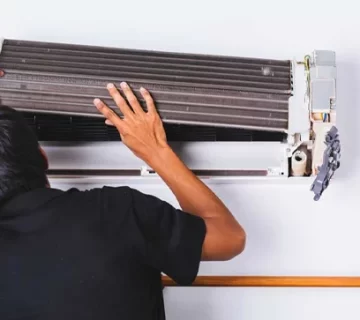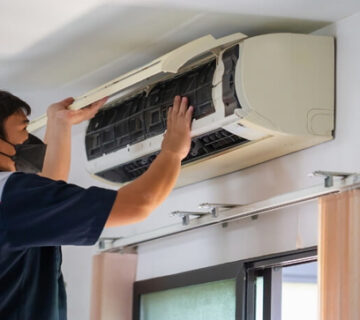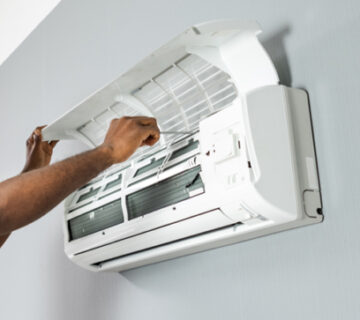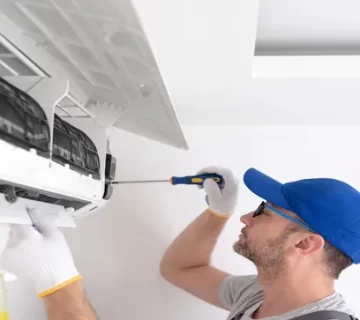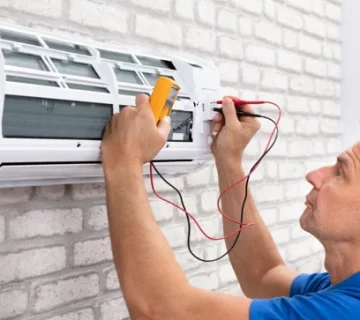A comfortable and healthy house depends on maintaining high indoor air quality. Your air conditioner (AC) not only cools your home but also plays a big role in the air you breathe. Ensuring the best indoor air quality means taking care of your AC system and following some simple tips. Good indoor air quality helps prevent allergies, reduces dust, and keeps everyone feeling better. This guide will help you learn how to keep your AC working well and your indoor air fresh. We will share easy and practical tips to achieve the best indoor air quality. Cleaning AC filters regularly, using dehumidifiers, ensuring proper ventilation, and getting regular maintenance are some of the key steps. These actions are simple but very effective. By following these essential tips, you can enjoy a healthier living environment with clean and fresh air. Your AC will work better, and you will have peace of mind knowing that your home has the best indoor air quality. Let’s explore these tips to keep your indoor air quality at its best with your AC system.
Here are some essential tips for maintaining good indoor air quality with AC.
1.Regularly clean or replace the AC filters
The Reasons for Its Significance
A/C filters are essential for maintaining clean air in your house. They capture dirt, dust, and other tiny particles to stop them from blowing back into your rooms. These filters are unable to perform as intended when they become blocked. This not only lowers the quality of the air in your home but also makes your air conditioner work harder, increasing energy costs, and possibly even breaking down.
How to Do It
A small but effective change or cleaning of your AC filters can have a significant impact. It is recommended to check most filters once a month. It’s time to clean them or replace them if they appear unclean. You may easily replace your throwaway filters by purchasing new ones from hardware stores. Take out any reusable filters you may have and give them a good cleaning in warm, soapy water. After they are entirely dry, replace them. For optimal results, repeat this treatment every one to two months.
Tips
- Make a note to check your filters frequently on your calendar or phone.
- You may need to inspect and replace your filters more frequently if you have pets or live in a dusty environment.
- Observe the manufacturer’s directions at all times.
2. Maintain dust-free vents and registers
The Reasons for Its Significance
Your home’s registers and vents serve as the air conditioning system’s lungs. They maintain the comfort of your house by letting air enter and exit. But in certain places, dust and debris can gather. The air quality in your house can be worsened when your air conditioner blasts air via filthy vents, which can disperse dust and allergens.
How to Do It:
It’s simple to maintain clean vents and registers. To clear the vents’ surface of dust, use a duster or a vacuum with a brush attachment. You can unscrew the vents and give them a thorough cleaning with warm, soapy water. Prior to replacing them, make sure they are totally dry.
Tips
- To avoid dust accumulation, regularly vacuum the area surrounding the vents and registers.
- To prevent dust and debris from entering your air conditioning system, think about utilizing vent filters.
- Make sure that nothing blocks the vents, such as furniture, as this can reduce airflow and lower the quality of the air.
3. Use a dehumidifier
The Reasons for Its Significance
Elevated relative humidity can lead to an uncomfortable atmosphere in your house and facilitate the development of mold and mildew. Mold spores can cause allergies and respiratory problems, which can be detrimental to your health. By regulating the moisture content in your house, a dehumidifier can help reduce the growth of mold and enhance indoor air quality.
How to Do It
Dehumidifiers are appliances that lower the relative humidity in the air. The basement and bathroom are two places in your house where you can put a portable dehumidifier because they are higher humidity locations. Additionally, a lot of contemporary AC units have built-in dehumidifiers. For optimal effects, adjust your dehumidifier to maintain interior humidity levels between 30 and 50%.
Tips
- Regularly inspect and drain the water reservoir in your dehumidifier as needed.
- As directed by the manufacturer, clean the dehumidifier’s filter.
- Think about keeping an eye on the humidity levels in your house with a hygrometer.
4. Verify adequate ventilation
The Reasons for Its Significance
To have good interior air quality, ventilation must be done properly. It lets stale air go out of your house and fresh air in. Pollutants such as dust, pet dander, and chemical fumes from cleaning supplies can accumulate in an unventilated space, resulting in poor air quality and health problems.
How to Do It
You can guarantee adequate ventilation in your house with a few different methods. Opening windows and doors during pleasant weather is the simplest method. This facilitates the flow of fresh air and aids in the removal of contaminants within. In bathrooms and kitchens, exhaust fans also aid in clearing moisture and stagnant air. Verify that these fans are in good operating order and are utilized frequently.
Tips
- To get rid of moisture and smells, use exhaust fans both during cooking and after taking a shower.
- An air exchanger can be installed and will provide continuous ventilation without consuming a lot of electricity.
- Verify that exhaust fans and vents are operational and unobstructed.
5. Arrange for continuous air conditioning maintenance
The Reasons for Its Significance
Maintaining good interior air quality and keeping your air conditioning system operating efficiently can be achieved with routine expert maintenance. The unit’s internal components may wear out or malfunction with time, and dust and dirt may gather there. To guarantee that your air conditioner operates efficiently and circulates clean air, a specialist may inspect the system, clean it, and perform any required repairs.
How to Do It
Make an appointment for expert AC maintenance at least once a year, preferably before the arrival of the hot season. The technician will check and clean the coils, fins, and ductwork, among other aspects of the AC unit, during this visit. In addition, they will test the thermostat, verify that all parts are functioning, and check the levels of refrigerant.
Tips
- To monitor the condition of your AC system, maintain a log of your maintenance visits.
- In between professional visits, ask the technician for advice on how to maintain your particular AC equipment.
- For routine inspections and cost savings on services, think about committing to a maintenance plan with your HVAC provider.
Conclusion
Maintaining good indoor air quality with your AC is very important for a healthy and comfortable home. By following a few simple tips, you can ensure that your air conditioner provides clean and fresh air. Regularly cleaning or replacing the AC air filter is one of the easiest ways to improve indoor air quality. This helps your AC run efficiently and prevents dust and allergens from circulating in your home. Using air conditioner tools, such as dehumidifiers, can help control moisture levels and prevent Mold growth. Proper ventilation is also key to maintaining fresh air. Make sure to open windows when possible and use exhaust fans in kitchens and bathrooms. Regular maintenance of your AC is crucial. Scheduling professional check-ups can help identify any issues early and ensure your system is running smoothly. It’s also a good idea to keep some AC spare parts on hand for quick fixes. By taking these steps, you can enjoy the benefits of good indoor air quality and a well-functioning AC. Your home will be more comfortable, and you will breathe easier knowing that your air is clean and fresh. Remember, a little care goes a long way in keeping your indoor air quality at its best.


